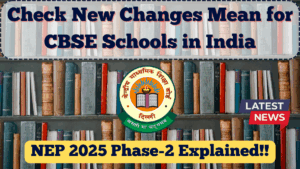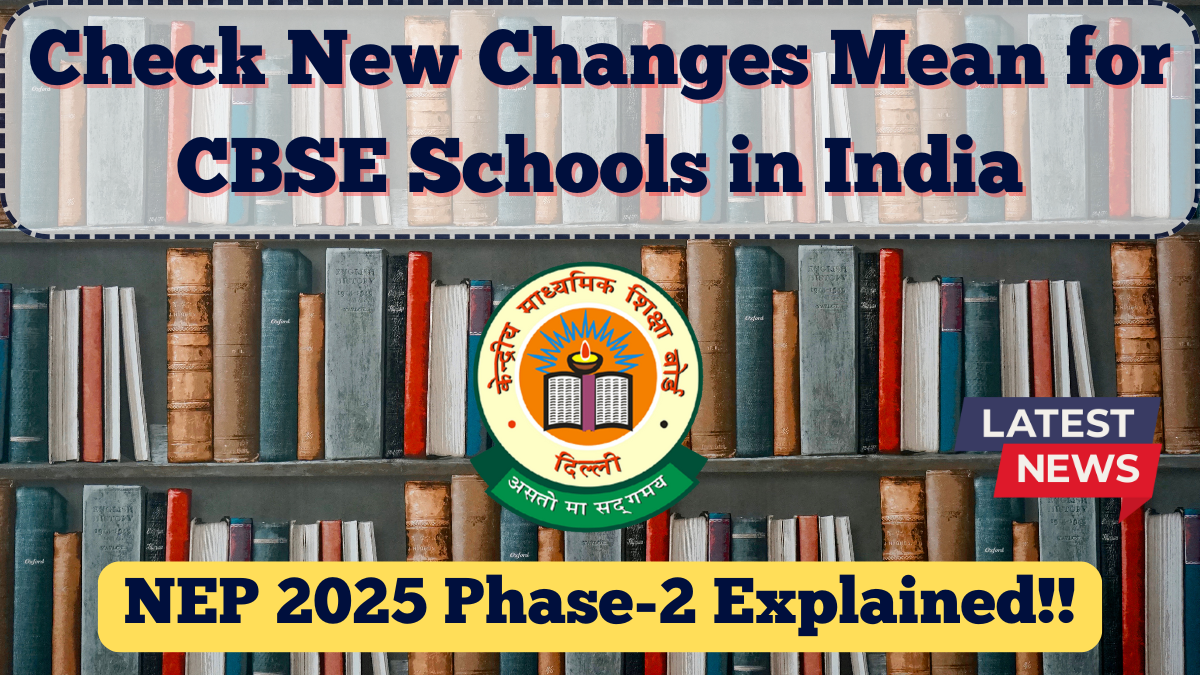NEP 2025 CBSE implementation has officially moved into Phase-2, marking a significant shift in how education is structured, taught, and assessed across Indian schools. This update is not just a policy reform but a major transformation of India’s education system, designed to align students with real-world skills, critical thinking, and flexibility in learning. Schools affiliated with the Central Board of Secondary Education (CBSE) are now actively restructuring their teaching models in accordance with this rollout.
With NEP 2020 laying the foundation, the 2025 phase introduces deeper changes into classroom practice, teacher training, and evaluation systems. The Phase-2 rollout focuses on converting vision into action, particularly in middle and secondary education, as per CBSE’s new academic norms. This reform is not just meant to benefit high-performing institutions but also aims to uplift learning standards in rural, tribal, and semi-urban school settings across the country.

What NEP 2025 Phase-2 Means for CBSE Schools
Here’s a quick overview of the most impactful changes under NEP 2025 CBSE Phase-2:
-
Curriculum redesign to introduce flexibility in subject selection from Grade 9 onwards
-
Inclusion of vocational and skill-based education as core parts of the syllabus
-
Integration of coding, AI, financial literacy, and digital fluency
-
Shift from rote memorization to competency-based learning modules
-
Emphasis on foundational literacy and numeracy (FLN) even at higher grade levels
These changes are designed to ensure students are future-ready, not just exam-ready, aligning with India’s larger vision of becoming a global education hub.
New Assessment and Evaluation Systems
One of the most significant reforms under NEP Phase-2 is in student assessment and reporting. CBSE has rolled out new models that encourage competency-based education, moving away from purely marks-based results.
| Evaluation Component | Old System | NEP 2025 CBSE System |
|---|---|---|
| Exams | Annual board exams | Modular exams, project-based |
| Internal Assessments | 20–30% focus | 50% or more focus |
| Skill Evaluation | Rarely included | Mandatory across classes |
| Reporting | Marks only | Holistic progress card |
This new format ensures that students are assessed based on creativity, application, and understanding—not just memorization.
Teacher Training and Curriculum Support
NEP Phase-2 doesn’t only affect students—it brings major changes for teachers too. CBSE is working with NCERT and DIETs to upgrade teacher capabilities.
Some key updates:
-
Mandatory orientation programs for all educators under CBSE
-
Digital training modules launched via the DIKSHA portal
-
Teachers to be trained in multi-disciplinary and blended teaching
-
Continuous professional development hours made compulsory
These steps are being rolled out with support from state education boards and teacher training institutes to ensure smooth adaptation.
Subject Flexibility and Vocational Focus
Under NEP 2025 CBSE, students in Grades 9 to 12 now have the flexibility to mix traditional academic subjects with skill-based and vocational subjects. This includes:
-
Entrepreneurship
-
Data science
-
Artificial Intelligence
-
Agriculture, Tourism, and Retail
-
Media and Communication
Students can now choose combinations like Maths + Painting + AI or Commerce + Financial Literacy + Psychology—moving away from rigid Science, Arts, and Commerce divisions. This aligns with global education models and helps students explore interests early.
FAQs
What is NEP 2025 CBSE Phase-2 implementation?
It refers to the second stage of NEP reform in 2025 where CBSE schools adopt flexible curriculums, skill education, and competency-based learning systems.
How does NEP 2025 affect exam patterns in CBSE?
Traditional board exams are being replaced with modular, skill-based assessments and internal evaluations that focus on learning outcomes.
Will students have to study new subjects under NEP 2025 CBSE?
Yes, subjects like AI, coding, and financial literacy are being introduced. Students can also choose skill subjects from Grade 6 onward.
What are the changes in teacher responsibilities under NEP?
Teachers must complete digital training, adapt to blended learning, and focus on project-based and student-centric teaching methods.
Is NEP 2025 applicable only to CBSE schools?
While this article focuses on CBSE, NEP 2025 guidelines apply to all recognized schools under state and central boards across India.
Click here to know more.
